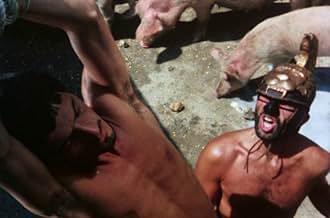Der christliche Glaube einer römischen Garde, der einem niedrigen Außenposten zugewiesen wurde, kollidiert mit dem Wunsch seines schwulen Kommandanten nach Nähe. Gequält zu werden wird zum V... Alles lesenDer christliche Glaube einer römischen Garde, der einem niedrigen Außenposten zugewiesen wurde, kollidiert mit dem Wunsch seines schwulen Kommandanten nach Nähe. Gequält zu werden wird zum Vergnügen.Der christliche Glaube einer römischen Garde, der einem niedrigen Außenposten zugewiesen wurde, kollidiert mit dem Wunsch seines schwulen Kommandanten nach Nähe. Gequält zu werden wird zum Vergnügen.
- Auszeichnungen
- 1 Nominierung insgesamt
- Sebastian
- (as Leonard Treviglio)
- Emperor's Guest
- (Nicht genannt)
- Emperor's Guest
- (Nicht genannt)
- Emperor's Guest
- (Nicht genannt)
- Emperor's Guest
- (Nicht genannt)
- Emperor's Guest
- (Nicht genannt)
- Emperor's Guest
- (Nicht genannt)
- Emperor's Guest
- (Nicht genannt)
Empfohlene Bewertungen
Consider the film's approach to homosexuality. No one is defined as being a homosexual, so that at first seems like a de-politicization of sex -- all there are are acts, and acts are not political. But at the same time, it's acts that are disdained and made illegal, and without the "political" approach to defining (and thereby defending) people as homosexuals, it leaves the acts open to censorship and condemnation -- politicization. As a film itself, though, it is not pedantic or accusatory -- in fact, Sebastian is killed, it seems, because of the lust of Severus, who he refuses. Like the Christian God who Sebastian loves and sees as more beautiful than Adonis, Severus wants Sebastian. But it isn't just condemning lust, either -- Anthony and Adrian are openly lovers, and the abundance of male nudity, and the eroticism of it by Jarman, could hardly be called prudish. In fact, there is a scene at night of the men grabbing each other, their dark-lit bodies, and the soldier pressing his near-naked, muscled body on his lover, that still seems shocking in its passion today.
It's more like a lyrical tone poem, and Brian Eno's New Age-y score goes well with that. Jarman isn't a bully, and when the crucifying comes around he doesn't bludgeon us -- first we see a close-up of his face, as arrows pierce through Sebastian's skin, silently with the exception of the wind, and Jarman gives us one final distorted image to meditate on the death of the one we can't have. 9/10
Sebastiane, a Christian, is exiled to a remote sort of military camp. The emphasis as has been said is clearly on the visual.The air permeates and oozes of sexual desire and longing. Soldiers are half naked throughout, often wrestling, joking, and talking a lot about sex. Sebastiane, stands apart because of his Christian beliefs, and the film explores the sado masochism inherent in martyrdom, the pleasure the pain brings, further strengthening his convictions. Sebastiane believes strongly in a higher power and the film itself seems em bused with a spirituality in its slow contemplative shots of nature. The film also deals heavily with unrequited love, both Justin and Severes have an eye for Sebastiane but express it in very different ways. There is also a gay couple among the soldiers whose love is tender and natural. Jarman has a distinct "voice", his films and imagery feel deeply personal and are generally in my opinion fascinating to watch.
Sebastiane's "obsessive" Christian faith rivals the lustful obsession of Serverus for this unattainable man. The movie doesn't flinch from showing how brutal desire can be; it is a hard master for both Serverus and Sabastiane. What I came away from the film with is the powerful question: What horrors and debasements will we all put ourselves through for the object of our lust?
Visually striking (as is typical of Jarman), this film is best known for being the first film to be filmed entirely in Latin (The Holy Office (from Spain) in 1975 had some dialogue in Latin, but also Hebrew), and also for being Jarman's debut feature (he had worked on three pictures beforehand, including Ken Russell's The Devils, but this was his first directing job). As with most of Jarman's work, Sebastiane is very arthouse, and will rarely be played on television (Channel 4 here in the UK last played it a few years ago in a Jarman season). Next time it's on, do as I intend to do, and watch it.
Wusstest du schon
- WissenswertesWhen asked about the film's nudity, director Derek Jarman replied "We couldn't afford costumes."
- PatzerThe soldiers play with a modern Frisbee in one scene. When one soldier catches it, the logo appears.
- Zitate
Sebastian: His eyes are so beautiful. He has sky-blue eyes.
Justin: What is this? What are you talking about?
Sebastian: His hair is like the sun's rays.
Justin: Sebastian...
Sebastian: His body is golden like molten gold. This hand of his... will smooth away these wounds. Justin, he is as beautiful as the sun. This sun which caresses me... is his burning desire. He is Phoebus Apollo. The sun... is his... burning kiss.
- Alternative VersionenWhen shown on British television in the 1980s, a shot of a naked man with the erection was cut out of the film.
- VerbindungenFeatured in Arena: Derek Jarman - A Portrait (1991)
Top-Auswahl
- How long is Sebastiane?Powered by Alexa
Details
Box Office
- Weltweiter Bruttoertrag
- 4.091 $
- Laufzeit1 Stunde 26 Minuten
- Sound-Mix
- Seitenverhältnis
- 1.37 : 1
Zu dieser Seite beitragen
























